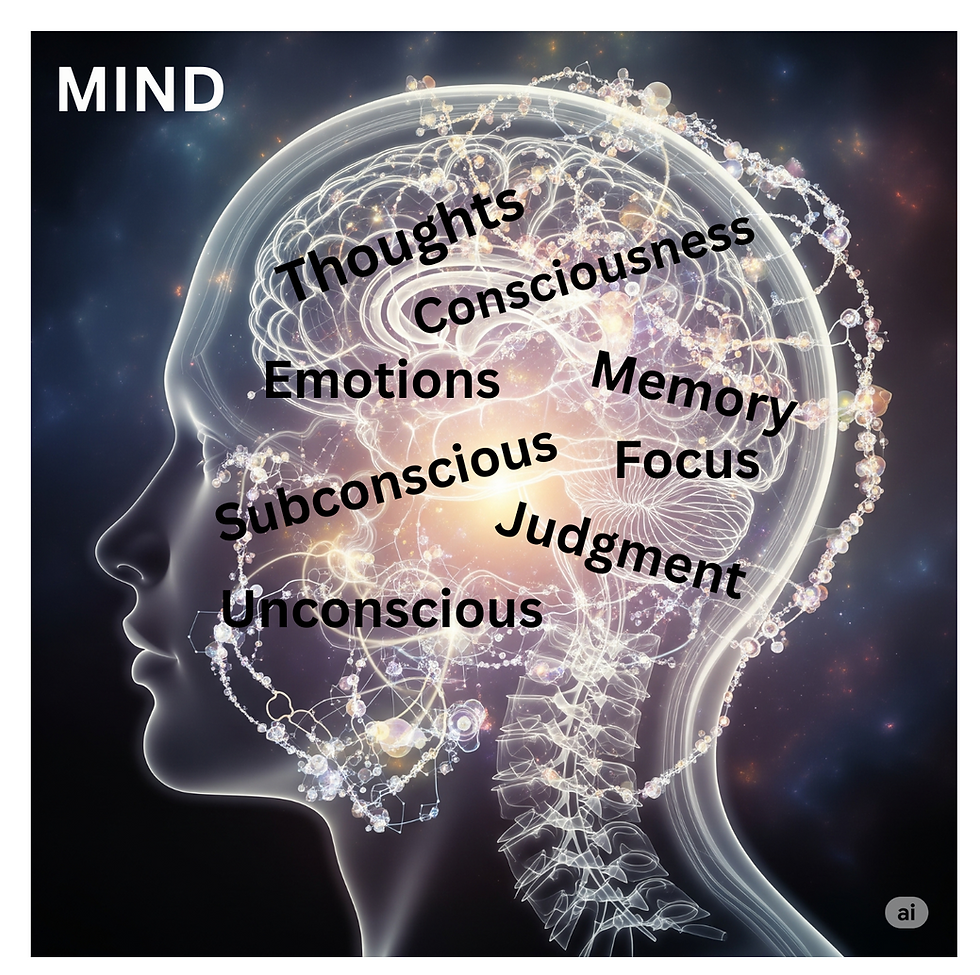Brain vs. Mind: What's the Difference?
- nranzithkumar
- Jul 12
- 2 min read
Understanding the Mind: Beyond the Brain
In everyday life, we say things like “My mind is wandering” or “I can't control my thoughts.” But what exactly do we mean by “mind”? Is it just another word for the brain — or is it something entirely different?
For thousands of years, scholars, mystics, and scientists have pondered this mystery. Ancient beliefs often placed the mind within the heart, symbolizing emotion and intuition. Today, neuroscience has shown that specific parts of the brain consist of networks of neurons that handle thinking, memory, perception, and emotion.
This suggests a deeper idea: while the brain is the physical structure, the mind is something intangible that a non-physical force governs how we interpret the world, make decisions, and experience life. In this article, we'll uncover the mind through both science and psychology.

💭 What the Mind Is Not
Let’s be clear: the mind and brain are not the same. The brain is a visible organ — made up of nerves, synapses, and biochemical reactions. It works like hardware, managing sensory input and controlling our bodies. Damage to certain brain areas can reduce mental ability, showing how connected the two are. Different brain regions generate electrical activity linked to:
Thoughts
Emotions
Awareness
Sensory experiences
Focus
Memory
Judgment
Consciousness
Think of it like this:
· The brain is the hardware — solid and functional.
· The mind is the software — invisible yet essential to who we are.
The Mind’s Inner Structure
Experts in psychology divide the mind into different layers:
Conscious mind: This is your present state — what you’re thinking and feeling right now.
Subconscious mind: Stores past experiences and beliefs that subtly influence your behavior without you realizing.
Unconscious mind: A hidden layer where deep fears, desires, and motives are buried — affecting your actions in unseen ways.

Why Understanding the Mind Is Valuable
Understanding how the mind works is not just theory — it leads to:
Stronger emotional health
Greater self-understanding
Improved choices and relationships
In essence, the mind creates your inner reality — your identity, emotions, and worldview.
How the Mind Operates
The mind continuously takes in signals from your senses, compares them to past knowledge, and creates a response — whether it’s a thought, feeling, or action.
Even while sleeping, your mind remains active — that’s why you dream. It helps you learn, adjust, and make meaning from experiences.
The Link Between Mind and Body
Though the mind lacks physical form, it directly interacts with the body. Any change in the brain’s structure or chemical balance can influence your mental state. This mind-body loop is central to areas like psychosomatic research, mindfulness, and mental health therapies.
Final Reflection
Though invisible, the mind is the space where our deepest thoughts, choices, and emotions take form. By understanding its power, we take the first step toward self-growth, clarity, and peace.







Comments